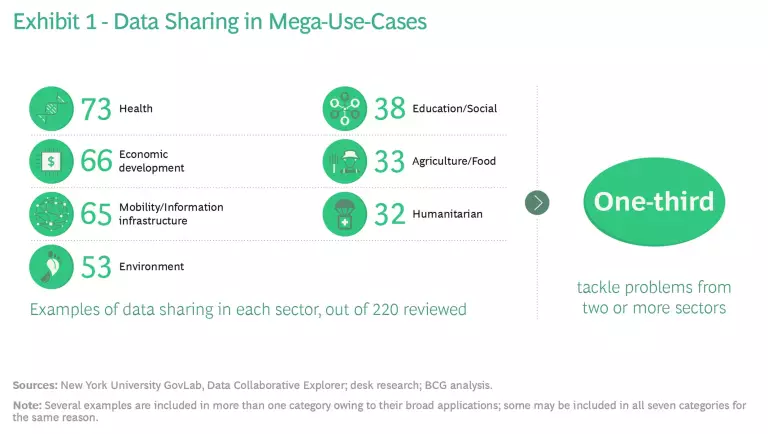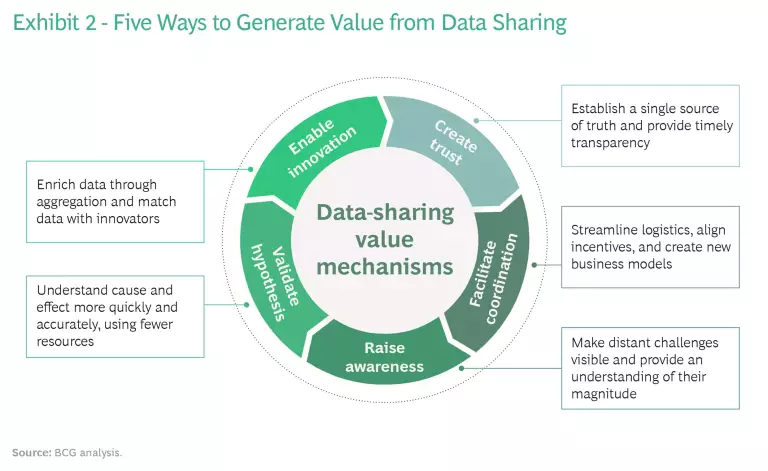This is the eighth article in a multipart series.
Achieving most, if not all, of the UN’s 17 sustainable development goals (SDGs) will require the use of data from multiple public and private sources. In this sense, the SDGs are the embodiment of what we call “data mega-use-cases”: complex problems and opportunities affecting many different individuals, companies, organizations, and governments. Financial inclusion, crisis response, resource conservation, public health, and climate change are all examples of data mega-use-cases encompassed by the SDGs. But data can only contribute to the solution of these problems if it is readily available and shared.
The good news is that there is increasing focus on using big data to support the SDGs. The UN has put forth specific big data mega-use-cases and has launched the Global Pulse initiative to bring the power of big data and artificial intelligence to bear on the SDGs. Many of the UN’s use cases leverage telecom, mobile, search, and sentiment data from social media. Over the last four years, UN experts and business leaders have met annually at the UN World Data Forum to discuss these and other opportunities.
Read the other articles in the series
- Innovation, Data, and the Cautionary Tale of Henrietta Lacks
- Contact Tracing Accelerates IoT Opportunities and Risks
- The Risks and Rewards of Data Sharing for Smart Cities
- What B2B Can Learn from B2C About Data Privacy and Sharing
- How Far Can Your Data Go?
- Simple Governance for Data Ecosystems
- Europe Needs a Smarter, Simpler Data Strategy
- Where Is Data Sharing Headed?
- The New Tech Tools in Data Sharing
For their part, businesses have so far focused primarily on economic value creation from data. But with data’s expanding role in achieving environmental, social, and governance goals, companies need to broaden their horizons. Sharing data—from the Internet of Things (IoT) and other sources—with companies and organizations participating in ecosystems and public-private partnerships can be both a key part of a company’s total societal impact strategy and a foundation for sustainable business model innovation .
The Value of Data Sharing
BCG explored more than 550 data-sharing projects and innovative or sustainable business initiatives. Of these, we identified 220 examples of data sharing for mega-use-cases. (See Exhibit 1.)
The scope of these initiatives is broad, covering more than seven sectors. Since the same shared data can be used for many purposes, it is not surprising that a third of the projects we identified benefit two or more sectors. For example, a shared geolocation data set helps with efforts to track the potential spread of a virus (health), informs measures to reduce air pollution (environment), and helps with data-driven infrastructure decision making (mobility). Exhibit 2 illustrates the ways in which value can be generated from data sharing for mega-use-cases.
Below we examine five mega-use-cases that illuminate a few of the ways in which data sharing is helping to address some of the world’s most challenging problems.
Financial Inclusion
In 2018, the World Bank estimated that there are some 1.7 billion unbanked adults worldwide. While many factors contribute to this problem, three of the biggest are the cost of banking, the need for documentation, and people’s lack of trust. Underlying these is the need for financial institutions to accurately assess the risk profile of potential customers. For many individuals with limited or no credit history, providing the required information has long been an insurmountable hurdle.
Financial institutions have recently succeeded in expanding access through microfinance and other channels thanks to data shared by and about consumers. China’s Ant Financial and Chile’s Destácame use novel data sources (platform payments and utility bills, respectively) to build alternative credit scores for the financially underserved. By finding creative ways to use data intended for other purposes —such as e-commerce or payment—to assess an individual’s ability to pay back a loan, these companies are able to extend credit access to the unbanked and underbanked.
Disaster and Incident Response
In the event of an epidemic, earthquake, hurricane, or other disaster, the UN’s Humanitarian Data Exchange allows governments and relief organizations to share data and coordinate response efforts so that support gets to the people and places that need it most. During the COVID-19 pandemic, more than 100 data sets have been released on this exchange, from government response information to case counts to mobility data.
At a local level, the Waze Connected Citizens Program is a two-way data exchange involving millions of users in more than 1,000 cities, along with public-sector partners in multiple countries, to facilitate coordinated responses to traffic accidents. Data on accidents and road conditions sourced from users is subsequently anonymized and shared with governments for use in infrastructure planning. Government agencies, in turn, provide data on maintenance efforts back to users through the exchange, allowing for better route planning.
By finding creative ways to use data intended for other purposes, banks have been able to extend credit access to the unbanked and underbanked.
Data sharing can also help validate hypotheses about postcrisis realities. Following Hurricane Katrina, for example, volunteer groups in New Orleans were able to save time and money on their rebuilding efforts by comparing pre- and poststorm mailing data from marketing company Valassis. The data enabled volunteers to shift hours away from labor-intensive population surveys and toward actual rebuilding efforts. Similarly, Valassis data was used to demonstrate the return on investment in revitalizing Detroit neighborhoods in a faster and more resource-effective way than ground surveys would have allowed.
Resource Conservation
In the last 20 years, the world has lost 10% of its forest cover. Deforestation and other types of resource loss can be insidious because they occur over geographically dispersed areas, often over long periods of time, and because harvesting typically takes place far from the point of consumption. Demand for rhinoceros horns in Asia, for instance, fuels poaching in Africa, with devastating effect on the species. Demand for palm oil in the US leads to unsustainable harvesting in the forests of Borneo. It is challenging for people around the world, as well as in the affected countries, to grasp the full extent of the problem or to act in a timely fashion.
The World Resource Institute’s Global Forest Watch raises awareness by closing the gap between deforestation sites and supply chain decision makers. Through satellite imaging and data shared by partner organizations and governments, the system alerts NGOs, governments, and individuals of deforestation taking place around the world. Its PALM (Prioritizing Areas, Landscapes, and Mills) risk tool lets companies spot deforestation in their palm oil supply chain before it happens, enabling them to intervene in time.
By aggregating data from multiple locations, Global Forest Watch also raises awareness of the problem’s magnitude. Visualization of historic data allows users to grasp the extent of deforestation across time and space. Users can review historic trends worldwide or delve into specific countries to understand the impact of such factors as logging and conservation policy. This kind of data aggregation can help connect pockets of anecdotal data to reveal a compelling narrative.
Data sharing can facilitate coordination and foster trust among multiple parties in a supply chain, enabling new business models in a circular economy.
Cisco has partnered with the World Wildlife Fund, Dimension Data (part of NTT), and FLIR Systems, a producer of night-vision cameras, to track wildlife populations and notify rangers of potential poaching activity in a number of game reserves. Cisco contributes networking and IoT technology and develops solutions tailored to specific endangered species and their locations. Data from satellite imagery and tracking devices that indicates poaching activity is shared with authorities to raise awareness. Rhinoceros poaching in protected areas has plummeted 96% since the solution was implemented.
Data sharing can also facilitate coordination and foster trust among multiple parties in a supply chain, enabling new business models in a circular economy. For example, BASF's reciChain platform combines blockchain technology with functions that enable accurate tracking and secured sharing of data to improve the sorting, tracing, and monitoring of plastics throughout the supply chain. Manufacturers of polymers create a “digital badge” for their products, which are then tracked by consumer goods manufacturers, waste collectors, and recyclers. Blockchain enables and validates the sharing of data from the digital badges. Overall, reciChain enables a more circular supply chain for recycled plastics by helping to quantify recycled content, improve sorting quality, assess recycling economics, and monitor polymer life cycles.
Public Health
In the early months of the COVID-19 crisis, governments and public-health organizations scrambled to understand the characteristics of the novel coronavirus. Very quickly, global databases were established to monitor not only case counts but also the actions that governments were taking in response. With this data, researchers could study the effects of one country’s policy decisions, such as lockdowns and contact tracing, to inform policy decisions in others. Data sharing helped validate hypotheses at speed and scale.
Many organizations have contributed data drawn from their businesses to help researchers and others paint a more complete picture of the crisis. Cuebiq, a location data research company, transformed GPS data into a personal-mobility index. In the early months of the pandemic, Carnegie Mellon University used self-reported symptoms data from Facebook and Google surveys to compile interactive maps of COVID-19 indicators in the US. Kinsa, a health technology company, leveraged data from smart thermometers to forecast hotspots. Scripps used biometric data from wearable devices to better understand the leading health indicators of COVID outcomes. Since the crisis is far from over in many countries, this kind of real-world data gathering, aggregation, and sharing is still contributing to the evolving public-health response.
During the pandemic, data sharing has helped validate hypotheses at speed and scale.
Data sharing also enables coordination between public-health officials and private citizens. Some 500 contact-tracing applications have been developed worldwide. While these differ in level of success—and some raise privacy concerns—best-practice examples allow public-health officials to inform citizens of local COVID risks and allow citizens to help public-health officials paint a more complete picture of local COVID rates.
Climate Change
Combating climate change requires a combination of existing solutions with new insights and technologies. Data sharing can further innovation by allowing the aggregation of data from a variety of sources and by easing access for innovators and scientists. Aggregation can involve combining multiple instances of the same data (such as time series and large samples) or different types of data (such as machine performance and energy consumption).
Precision agriculture showcases the power of aggregating and analyzing data from many sources in the development of new technologies. The data on which it is based can come from equipment and field sensors, survey instruments, and field robots, as well as from satellite imagery and drones. It can be used not only to increase farmers’ yields and profits, but to tackle climate change.
In 2019, Indigo Ag launched Indigo Carbon with the goal of incentivizing farmers to remove carbon from the atmosphere and sequester it in their soil. In the first phase, Indigo partners with other organizations to use data shared by farmers to quantify soil carbon, along with methane and nitrous oxide emissions, and accelerate carbon sequestration. In the future, Indigo plans to pay farmers who embrace regenerative agriculture for each ton of carbon captured and to sell certifications to companies that want to compensate for their carbon footprints. By working with established market regulators, Indigo is supporting a transparent marketplace and acting as an intermediary, thereby injecting trust into the carbon credit market.
Broader data sharing can harness talent for innovation. Schneider Electric is aggregating data from partners and customers on its EcoStruxure platform, facilitating data sharing with application developers on its Schneider Electric Exchange, and sponsoring competitions on DrivenData for new energy management solutions.
In previous articles in this series, we argued that effective data-sharing ecosystems achieve a balance among the value, risks, and costs involved in accessing and using participants’ data. There are still many barriers, but given the potential value shown by the mega-use-cases described above and many others, public- and private-sector leaders should think hard about where they can contribute and how they can overcome the hurdles. Leaders of companies looking to broaden their total societal impact strategies can assess which data assets they can contribute by asking themselves these questions:
- Where can our enterprise data be used for greater transparency? Can we help generate trust among parties to develop novel solutions to society’s most critical problems?
- Can our data be used to raise awareness? To measure outcomes?
- Can we share our data on a platform or in an ecosystem to promote greater innovation? Can we participate in developing new solutions by leveraging sources of data outside our company?
Addressing these questions can help businesses find opportunities to share their data directly for the good of society. It can also help identify opportunities to develop new business models that will promote both business advantage and social benefits. Participating in data ecosystems as a data or solution provider can be a critical part of a comprehensive strategy for total societal impact and sustainable business model innovation.
The authors thank their colleague Dominique Lacassie for contributions to this article.













